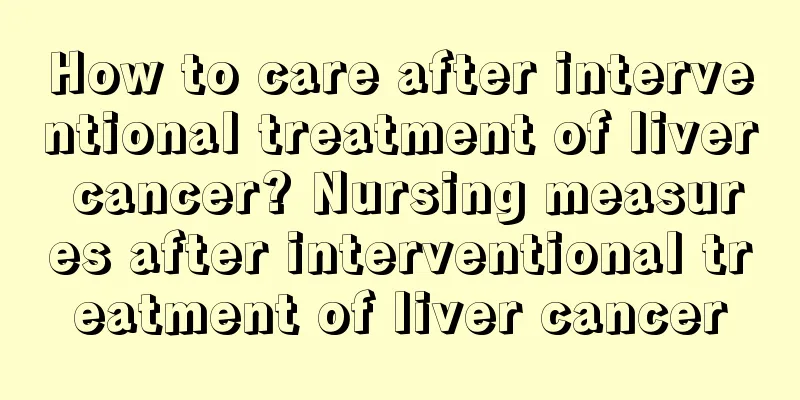How to care after interventional treatment of liver cancer? Nursing measures after interventional treatment of liver cancer

|
Liver cancer is the second most common malignant tumor in my country. There are many ways to treat the disease, and interventional treatment is the most common one in our lives. However, after interventional treatment, patients should pay attention to many care matters and not let their own neglect affect the treatment effect of the disease. 1. Vital sign monitoring. Closely observe changes in vital signs, including changes in the patient's consciousness, pulse, respiration, blood pressure, and SpO2. Monitor the ECG for 24 hours, measuring once every 1 hour until no abnormalities are found after 4 hours, then change to once every 2 hours. Measure body temperature 4 times a day for 3 consecutive days. If there is any abnormality, report it to the doctor in time for symptomatic treatment. 2. Care of the puncture site. Since interventional treatment is an invasive procedure, local puncture and catheterization can cause varying degrees of damage to the artery. In addition, the coagulation factor of liver cancer patients is reduced. Therefore, special care should be taken of the puncture site after surgery. The wound should be pressurized with a sandbag for 4 to 6 hours, and the patient should rest in bed for 12 hours. If the patient wants to sneeze or cough, family members should press the puncture site with their hands to prevent bleeding. 3. Nursing for abdominal pain. Embolism causes ischemia, edema, and necrosis of tumor tissue, which can cause abdominal pain of varying degrees, mainly manifested as local burning pain in the right upper abdominal liver area. Generally, the pain peaks 4 to 14 hours after surgery. Patients should be advised not to be nervous and relax to avoid aggravating the pain. If necessary, painkillers should be given according to the doctor's advice. Although interventional treatment methods have certain effects, liver cancer is not an easily curable disease. To treat the disease, patients should first seek medical attention as soon as possible. At the same time, patients should also build up confidence in curing the disease and not blindly undergo treatment and miss the best treatment time. |
>>: Three major early symptoms of lung cancer patients Precautions for early lung cancer
Recommend
Where is the best hospital for treating nasopharyngeal cancer
In recent years, the number of patients suffering...
Is it possible for teratoma to recur?
Ovarian teratoma is a common and frequently occur...
Do you know how to use a diaper pad correctly?
Infants and young children do not have the abilit...
How to use tampons to avoid gynecological diseases
When female friends use sanitary products during ...
What are the dietary taboos for bile duct cancer
Health is something that every one of us hopes to...
How is gastric bleeding diagnosed?
If our body is particularly healthy, we will defi...
Introduction to the use of tampons
I believe that many people have heard of tampons,...
Is ulnar styloid fracture serious?
Ulna styloid fracture is relatively common in lif...
Dietary considerations for lymphoma
Lymphoma is a serious malignant tumor. If it is n...
Symptoms of vasculitis
Perhaps everyone has noticed the pulse beating in...
What to pay attention to after liver resection
Generally speaking, do not perform liver resectio...
What to do if your heel gets blisters
In life, many people have experienced blisters on...
Genetic testing for thalassemia
What are the items needed for thalassemia gene te...
Herpetic pharyngitis
There are many common types of diseases. Differen...
Do blue light phone films really work?
With the rapid development of society, smartphone...









